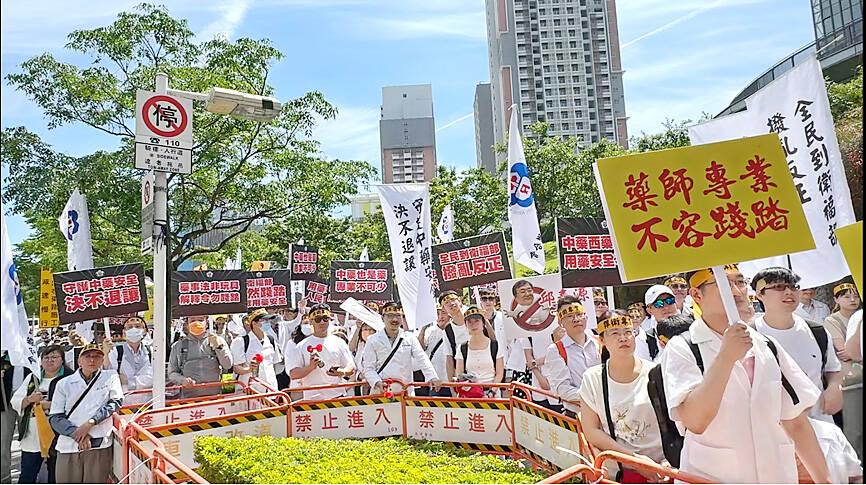The Federation of Taiwan Pharmacists Associations yesterday protested in front of the Ministry of Health and Welfare in Taipei over the ministry’s interpretation of Article 103 of the Pharmaceutical Affairs Act (藥事法), saying that it would allow those without professional pharmaceutical knowledge to run Chinese medicine businesses and pose a threat to pharmaceutical safety.
Federation of Taiwan Pharmacists Associations president Huang Jin-shun (黃金舜) said the protesters demanded the ministry withdraw its interpretation of the article and called for Minister of Health and Welfare Chiu Tai-yuan (邱泰源) and Department of Chinese Medicine and Pharmacy Director-General Su Yi-chang (蘇奕彰) to step down over the matter.
The federation would convene a larger group to protest on Ketagalan Boulevard in Taipei on May 4, Huang added.

Photo: CNA
However, the National Union of Chinese Medicine Association said that the ministry’s interpretation helped guarantee the development of the Chinese medicine industry.
The industry had more than 15,000 operators two decades ago, a number which has almost halved, it said, adding that it estimated there would be fewer than 3,000 operators a decade from now.
The National Union of Chinese Medical Doctors’ Association said that the ministry’s interpretation did not pertain to the pharmaceutical aspect of the industry, and clear-cut definitions on the standard of qualification for Chinese medicine personnel would help attract more talent to the industry.
The Taiwan Traditional Chinese Medicine Economic and Commercial Association urged the public to support the ministry’s measure, saying that if the downstream distributors of Chinese medicine were to disappear, it could lead to the collapse of the entire Chinese traditional medicine industry.
The decline in Chinese traditional medicine has been too rapid, with too few pharmaceutical majors devoted to the sector, Su said, adding that the sector requires highly trained and experienced personnel from cultivation to storage.
Considering these needs, the ministry issued its interpretation on March 18 and would include herbal medicine as part of pharmaceutical medicine, he said.
The ministry would conduct a detailed categorization of prescriptions, over-the-counter medications and supplements based on safety and function, following thorough discussions with pharmaceutical companies and the food industry, he added.

The manufacture of the remaining 28 M1A2T Abrams tanks Taiwan purchased from the US has recently been completed, and they are expected to be delivered within the next one to two months, a source said yesterday. The Ministry of National Defense is arranging cargo ships to transport the tanks to Taiwan as soon as possible, said the source, who is familiar with the matter. The estimated arrival time ranges from late this month to early next month, the source said. The 28 Abrams tanks make up the third and final batch of a total of 108 tanks, valued at about NT$40.5 billion

A group from the Taiwanese Designers in Australia association yesterday represented Taiwan at the Midsumma Pride March in Melbourne. The march, held in the St. Kilda suburb, is the city’s largest LGBTQIA+ parade and the flagship event of the annual Midsumma Festival. It attracted more than 45,000 spectators who supported the 400 groups and 10,000 marchers that participated this year, the association said. Taiwanese Designers said they organized a team to march for Taiwan this year, joining politicians, government agencies, professionals and community organizations in showing support for LGBTQIA+ people and diverse communities. As the first country in Asia to legalize same-sex

MOTIVES QUESTIONED The PLA considers Xi’s policies toward Taiwan to be driven by personal considerations rather than military assessment, the Epoch Times reports Chinese President Xi Jinping’s (習近平) latest purge of the Chinese People’s Liberation Army (PLA) leadership might have been prompted by the military’s opposition to plans of invading Taiwan, the Epoch Times said. The Chinese military opposes waging war against Taiwan by a large consensus, putting it at odds with Xi’s vision, the Falun Gong-affiliated daily said in a report on Thursday, citing anonymous sources with insight into the PLA’s inner workings. The opposition is not the opinion of a few generals, but a widely shared view among the PLA cadre, the Epoch Times cited them as saying. “Chinese forces know full well that

Travel agencies in Taiwan are working to secure alternative flights for travelers bound for New Zealand for the Lunar New Year holiday, as Air New Zealand workers are set to strike next week. The airline said that it has confirmed that the planned industrial action by its international wide-body cabin crew would go ahead on Thursday and Friday next week. While the Auckland-based carrier pledged to take reasonable measures to mitigate the impact of the workers’ strike, an Air New Zealand flight arriving at Taipei from Auckland on Thursday and another flight departing from Taipei for Auckland on Saturday would have to